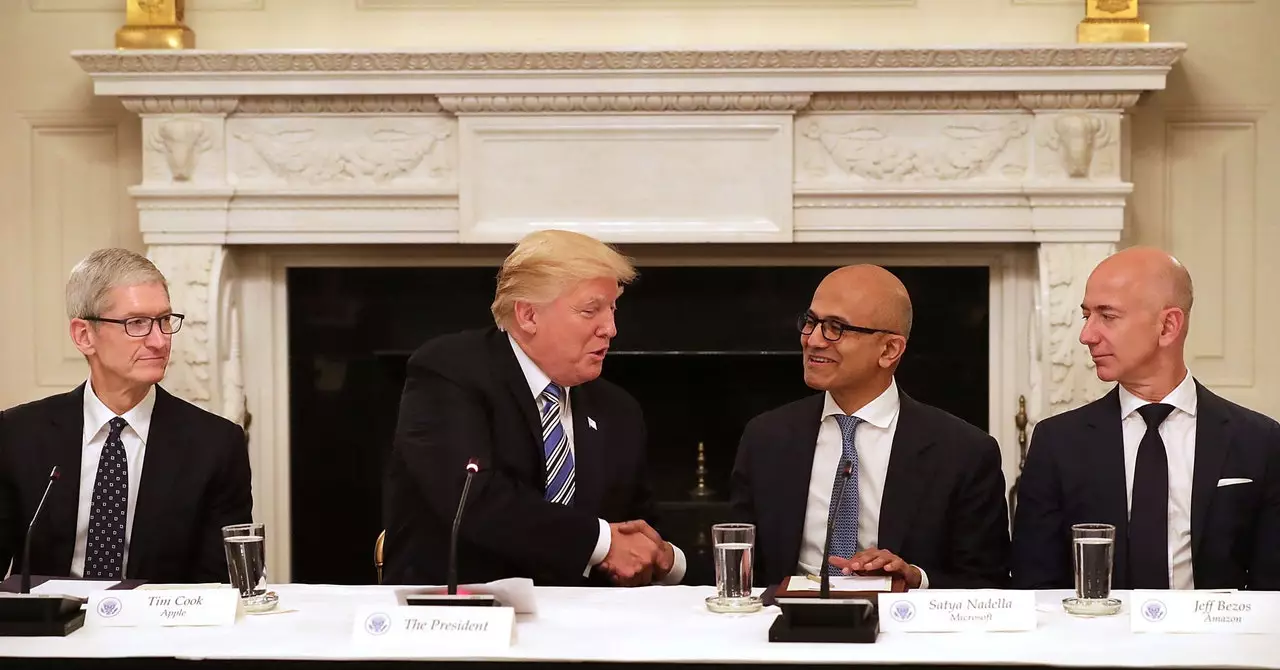In the intricate web of American politics, the intersection of regulation, technology, and financial innovation is vibrant and contentious. The recent waves of enthusiasm surrounding former President Donald Trump’s campaign have been punctuated by fervent declarations aimed at reforming regulations, particularly within the cryptocurrency sector and Big Tech. With fiery speeches that evoked raucous applause, Trump has delineated his approach, creating ripples of speculation about the future of those in powerful regulatory positions.
One of the resonant themes in Trump’s recent campaign engagements is his pledge to remove Gary Gensler, the current chairman of the Securities and Exchange Commission (SEC). Gensler has purged the regulatory landscape with a series of lawsuits targeting companies in the cryptocurrency realm, earning him both accolades and ire. For crypto enthusiasts, Trump’s promise strikes a chord of hope; many believe that Gensler’s policies are stifling innovation and undermining the potential of digital currencies. The populist tone of Trump’s promise reflects a broader sentiment among supporters who seek to mitigate what they perceive as governmental overreach in an emerging economic sector.
Trump’s declarations extend beyond merely reshaping the SEC’s leadership. He has also signaled intentions to commute the life sentence of Ross Ulbricht, the founder of Silk Road. The Silk Road marketplace played a pivotal role in the nascent cryptocurrency space by popularizing Bitcoin for transactions, albeit in controversial contexts. Supporters of Ulbricht argue vehemently that his punishment is excessive given the complexities surrounding digital commerce and the burgeoning market of cryptocurrencies. By targeting Gensler and backing Ulbricht, Trump positions himself as a champion of innovation and freedom in the face of regulatory constraints.
The discussion around regulatory reform naturally extends into the realm of antitrust laws and how they are enforced against Big Tech. A focal point in this arena is Lina Khan, the youngest-ever chair of the Federal Trade Commission (FTC), whose aggressive stance against corporate monopolies has ignited fierce debates. Khan’s tenure has been marked by various lawsuits against tech behemoths like Google and Meta, appealing to those who believe that these companies wield too much power in both economic and cultural landscapes.
Notably, Trump and his supporters have labeled Khan as detrimental to the American economy, especially criticizing her aggressive regulatory approach. Figures such as Dan Ives from Wedbush have labeled her leadership as a “nightmare for the tech sector,” asserting that her removal could expedite a wave of mergers and acquisitions within the industry. The implications are clear: a change in leadership at the FTC could recalibrate the balance of power in the technology sector, allowing for a more lenient regulatory environment that could fuel corporate growth.
Despite the ambitious promises, it’s crucial to approach Trump’s platform with a critical lens. While many anticipate that Trump will dismantle existing antitrust actions initiated during his prior administration, analysts like Adam Kovacevich suggest that a new approach to regulation is likely. Trump may leverage ongoing litigation against tech giants to negotiate more favorable stances regarding content moderation and freedom of speech issues, rather than abandoning these cases entirely. This creates a paradox where traditional regulatory avenues may remain active, but under a revised framework that caters to prevailing political sentiments.
Moreover, there’s a divergence among Trump’s allies regarding the path forward. Some, like Ohio’s J.D. Vance, emphasize breaking up companies as a strategy to curb perceived censorship of conservative voices. This highlights a growing ideological rift within the Republican Party between traditional oversight approaches and newer, more populist demands for corrective measures against perceived biases within tech platforms.
The anticipated changes stemming from Trump’s administration promise a shift in the regulatory landscape, particularly for cryptocurrency and Big Tech. As Trump positions himself as a disruptor of regulatory norms, the potential for significant changes in how these sectors are governed looms heavy. However, the path forward is fraught with complexities and contradictions, as established legal frameworks continue to engage with the realities of a rapidly evolving digital economy. Ultimately, whether these promises translate into effective policy changes will depend not just on Trump’s approach, but on the broader economic and political context that informs these emerging dialogues.


Leave a Reply